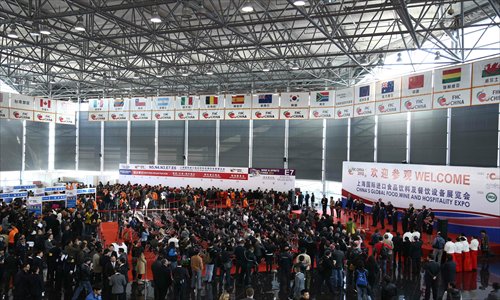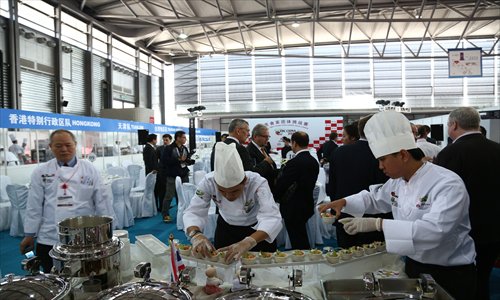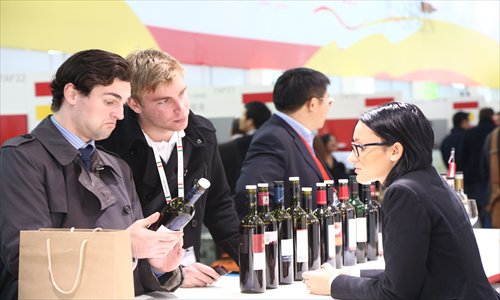Tempting tastes from abroad

As the increasingly affluent and quality conscious Chinese consumers develop a taste for international lifestyles, imported food and drinks are gaining in importance in the country. Over the last few years, China's demand for imported foods has continued to grow at a 15 percent annual rate.
The shift towards a greater interest in imported foods reflects different genres and different products and provides the background for China's National Bureau of Statistics forecast that China will become the world's largest market for imported food by 2018. By then, it has been estimated, the market will be worth 480 billion yuan ($77 billion).
Food and Hospitality China (FHC) caters to this growing demand. FHC has been a premium food and wine exhibition since 1994, and this year's show is its 17th outing in Shanghai. On November 13-15 at the Shanghai New International Expo Centre, more than 1,820 suppliers of imported food and wines will be looking for new business partners in the food and wine retail, hospitality, and catering or distribution sectors in China.
Brendan Jennings is the general manager of China International Exhibitions, the organizer of FHC. "The show has kept its direction and identity as an exhibition for imported food serving the top end of the market in China. It would have been so easy to dilute the show into a more general public event, which is always a temptation to go for growth and not worry about the quality. We rigidly maintain the quality of the exhibition in terms of the exhibitors and visitors, and consequently I feel this gives us a much better event for both our clients - exhibitors and visitors - and a much more relevant and strong event for the industry," Jennings told the Global Times.

The United Nations of Food
The FHC is called "the United Nations of Food" for a reason: it is dominated by international pavilions showcasing agricultural products from their countries or regions. This year, the number of pavilions hits a record high of 41. As well there are many individual companies exhibiting which means 70 countries and regions are being represented.
At FHC 2013, the Taiwan regional group with six blocks of exhibitors covering more than 1,000 square meters has the largest presence, closely followed by Spain with five blocks and then Korea, US, UK, and Germany. South and Central America are well-represented by pavilions from countries including Argentina, Brazil, and Mexico. Brand new faces are Belgium, Portugal, and Denmark.
Consequently, FHC is growing even more phenomenally with a 30 percent expansion in the floor area over last year. Together, the exhibition sections occupy four halls and exhibit the widest selection of imported foods in China from fresh and preserved foods to fruit and vegetables; seafood; bakery and dairy products and snacks; confectionery and chocolate; olive oil, spices and sauces; jams and flavorings; tea and coffee and many more.
A particularly rapid growth of meat suppliers has been apparent. "The demand for meat in China has exploded in the last few years, and Australia, Argentina, Brazil, and Canada are all scrambling for the Chinese market. It has more than doubled in the last two years. The demand for pork, beef, and chicken is also significant as buyers opt for imported quality," said Jennings.

Separate wine show
And there is another hall this year dedicated to ProWine China, a huge international wine fair organized in partnership with Messe Düsseldorf. For the first time in FHC history, the wine sector is no longer part of the FHC but has its own neighboring specialist wine and spirits show.
The response to ProWine China has been very encouraging. By August all the available space had been sold to more than 570 wine suppliers from the world's leading wine producing countries. The number of participants has more than doubled on previous outings.
Jennings believes this is the perfect time to split the wine trade from FHC but maintain the basic principles. "There has been phenomenal growth in imported wine. This is a trend that we know and we feel this is the right time to bring such a big brand to China. ProWine Germany is the biggest wine show in the world, and now it comes to Shanghai and alongside FHC. Wine is a peculiar industry in that wine companies like to have their own identity and image. Therefore we think the best way to do it is connect it to FHC but with a separate identity and specialization."
Learning and networking
At both FHC and ProWine there are several free competitions, wine tastings and seminars visitors can attend. More than 350 chefs are to take part in a Culinary Arts Competition, the only competition in China supported by the WACS (World Association of Chefs Societies) which will be watched closely by food and beverage managers and hotel general managers.
Baristas, roasters and coffee shop owners will head for the Ultimate Barista Challenge, an international contest that pits the best coffee makers in the world against each other in an action-packed highly entertaining series of duels. Wine enthusiasts will find plenty to their tastes in the China Sommeliers Wine Challenge at the ProWine Distributor's Club.
There is a lot more. Lily Zhu, the project manager for FHC, said butchers would find the meat preparation courses in the competition useful and ice cream enthusiasts or traders could attend the lectures on making gelato and marketing. "Seminars on olive oil explaining the differences in oils from a range of companies will run over the three days of the show and retailers and hospitality trade visitors can taste these olive oils and network with manufacturers and industry experts. Plus, the China pizza championship will again be staged presenting the most exciting dough spinning and pizza making performers."
Spanish participation
The last few years - between 2005 and 2012 - have been very positive for Spain's food and beverage trade growth in China (8 percent), followed by a 12 percent growth in the first half of this year compared to the first half of 2012.
Behind the trend, according to the Economic and Commercial Office of Spain in Shanghai, is the Chinese customers' growing appreciation of three major Spanish imports: pork (raw meat and Spanish ham products), wine, and olive oil.
In response to this, Spain is participating at FHC for the 12th time with a record-breaking 101 companies in total, making it the largest national pavilion. The largest group of suppliers will be wine companies and labels with 49 companies from different regions, and the second largest will involve olive oil producers and exporters.
"The wine culture in Spain started more than 1,000 years ago and the olive oil culture came from even before that. These are very important to our essence as a country, and many companies are family-run businesses. So it is not a big industry production, but something much more intimate and has to do with our people, with our families making the same product with care and with love for centuries," said Eduardo Euba Aldape, the head of the Economic and Commercial Office of Spain in Shanghai..
There are also large sections for Spanish bakery produce, cheese, chocolate, coffee, and last but not least, Spanish ham. At the pavilion a Spanish master ham cutter Francisco Alonso is set to impress the audience with his attempt to come up with the longest ever Spanish ham cut. Alonso is the holder of a Guinness World Record for the longest meat slicing marathon - he sliced through 75.6 kilograms of ham (18 whole hams) in just under 25 hours.
US participation
Chinese customers have been enjoying increased access to food products from the United States in recent years and this year's USA Pavilion will help satisfy the growing interest and demand for these products.
The major USA exhibitors at the FHC show include 42 food and beverage companies representing drinks, dairy products, nuts and dried fruits, packaged products, seafood, olive oil, and fresh fruit and vegetables.
"The geographical diversity of the United States is what allows it to produce such a wide range of products. Both small and large scale farming operations and industries are well-organized and highly sophisticated, and they can assure that their products are top-notch in quality," said Linston Terry, the deputy director of the Agricultural Trade Office, US Consulate General Shanghai.
Nuts from the United States like almonds, pistachios, pecans and walnuts, which can all be used in baking or making mooncakes as well as appreciated as snacks, have long dominated the Chinese market and will continue to be a bright spot at the FHC show. Also arriving in bulk is the country's rich variety of packaged products: processed and ready-to-eat snacks to make life easier. Another highlight will be the appearance of a generous selection of seafood products from the US West Coast.
Alongside that, 37 wine exhibitors from the United States will present their wines at the ProWine show. This is the very first time the country's most reputable and sought-after wine associations from the three big wine states of California, Washington, and Oregon will make their presence felt at a major wine show in mainland China. Both shows will provide Chinese consumers a chance to try some new-to-market, high quality products from the United States.
Austrian participation
"When Chinese people think of Austria they think of great music, the Musikverein in Vienna, literature. All of this is true, but what most don't know is that we are very proud of our good, natural food," said Raymund Gradt, the Consul with the Austrian Consulate General Shanghai Commercial Section.
As most of Austria is mountainous (there are some very high peaks) farming is difficult and the average farm size is small. "When you have a small farm your relationship with it is different from a relationship with large complexes. The people in charge check these farms intensively - for example every animal spends four or five hours a day outside when it is not winter. Things like this make a great difference to the quality," Gradt explained.
This year, 31 companies are taking part in the Austrian exhibition. A majority of them feature water, organic convenience food, biscuits, as well as the sweets which have been an all-time Austrian best-seller in China. A wide collection of chocolate, including the much loved Mozartkugel (a famous brand from Salzburg), will be on display.
Twenty-one companies will be promoting Austrian wines. As well as some of Europe's oldest winemakers, Austria is now proud of a new generation of winemakers, many of whom gained a wine education at specialist schools and universities.
Austria believes there is no "standard" taste for particular styles of wine and this is reflected in their product. "We think the wine should reflect the microclimate of the year. You should taste from the wine whether it has been a sunny or dry year. It is a journey and an adventure," Gradt explained.
On November 14 the pavilion will hold a fine wine tasting. There will be a short lecture about Austrian wine, but, said Gradt, the highlights will be in the tasting. "Just try it."